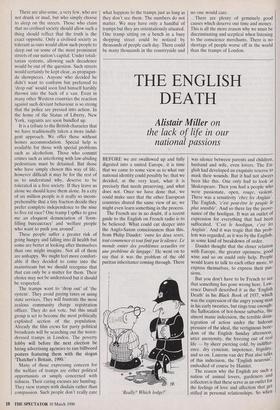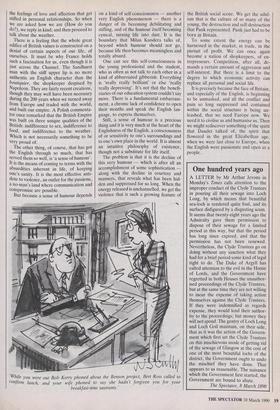THE ENGLISH DEATH
Alistair Miller on
the lack of life in our national passions
BEFORE we are swallowed up and fully digested into a united Europe, it is time that we came to some view as to what our national identity could possibly be; that we decided, at the very least, what it is precisely that needs preserving, and what does not. Once we have done that, we could make sure that the other European countries shared the same view of us; we might even learn something in the process.
The French are in no doubt, if a recent guide to the English on French radio is to be believed. What could cut deeper into the Anglo-Saxon consciousness than this, from Philip Daudet: 'entre les deux sexes, tout commence et tout finis par le silence. Le monde entier des problemes sexuelles est une probleme de langage.' He went on to say that it was the problem of the old puritan inheritance coming through. There
'Really? Which lodge?'
was silence between parents and children, husband and wife, even lovers. The En- glish had developed an exquisite reserve to mask their wounds. But it had not always been like this. One only had to look at Shakespeare. Then you had a people who were passionate, open, rouge, violent. There was a sensitivity 'chez les Anglais'. The English, 'c'est peat-are le peuple plus sensible'. And so there lay the prove- nance of the hooligan. It was an outlet of expression for everything that had been suffocated. 'C'est k hooligan, c'est k's Anglais'. And it was tragic that this prob- lem was regarded, as it was by the English, as some kind of breakdown of order.
Daudet thought that the closer relation with Europe, the greater openness, good wine and so on could only help. People would learn to talk to each other more, to express themselves, to express their pas- sions.
But you don't have to be French to see that something has gone wrong here. Law- rence Durrell described it as the 'English Death' in his Black Book of 1937, which was the expression of the angry young man in his early twenties, but rings true enough: the suffocation of hot-house suburbia, the almost manic indecision, the terrible disin- tegration- of action under the hideous pressure of the ideal, the vertiginous bore- dom of the English Sunday afternoon, utter anonymity, the freezing out of real life -- by sheer piercing cold, by indiffer- ence, dry cynicism, impotence, frigidity, and so on. Laurens van der Post also talks of this indecision, the 'English neurosis', embodied of course by Hamlet. The reason why the English are such a nation of animal lovers, gardeners and collectors is that these serve as an outlet for the feelings of love and affection that get stifled in personal relationships. So when
the feelings of love and affection that get stifled in personal relationships. So when we are asked how we are (How do you do?), we reply in kind; and then proceed to talk about the weather.
There is a feeling that the whole great edifice of British values is constructed on a denial of certain aspects of our life, of ourselves. It must be why France holds such a fascination for us, even though it is just across the Channel. The Sandhurst man with the stiff upper lip is no more authentic an English character than the boutiquier, the shopkeeper despised by Napoleon. They are fairly recent creations, though they may well have been necessary during the 200 years when we turned away from Europe and traded with the world, and built our empire. A Polish commenta- tor once remarked that the British Empire was built on three unique qualities of the British: indifference to sex, indifference to food, and indifference to the weather. Which is not necessarily something to be very proud of.
The other thing, of course, that has got the English through so much, that has served them so well, is 'a sense of humour'. It is the means of coming to terms with the absurdities inherent in life, of keeping one's sanity. It is the most effective anti- dote to violence, an outlet for the passions, a no-man's land where communication and compromise are possible. But because a sense of humour depends on a kind of self-consciousness — another very English phenomenon — there is a danger of its becoming debilitating and stifling, and of the humour itself becoming cynical, turning life into dust. It is the boundary that Milan Kundera talks of, beyond which humour should not go, because life then becomes meaningless and totally absurd.
One can see this self-consciousness in the young professional and the student, who as often as not talk to each other in a kind of abbreviated gibberish. Everything is 'really really brilliant' or else 'really really depressing'. It's not that the benefi- ciaries of our education system couldn't say more. There is a fundamental embarrass- mein, a chronic lack of confidence to open their mouths_ and speak the English lan- guage, to express themselves.
Still, a sense of humour is a precious thing and it is very much at the heart of the Englishness of the English, a consciousness of or sensitivity to one's surroundings and to one's own place in the world. It is almost an intuitive philosophy of existence, though not a substitute for life itself.
The problem is that it is the decline of this very humour — which is after all an accomplishment of some sophistication — along with the decline in courtesy and manners, that reveals what has been hid- den and suppressed for so long. When the energy released is unchannelled, we get the violence that is such a growing feature of 'While you were out Bob Kerry phoned about the Benson project, Bert Ross called to Confirm lunch, and your wife phoned to say she hadn't forgiven you for your breakfast-time tantrums.' the British social scene. We get the nihil- ism that is the culture of so many of the young, the destruction and self-destruction that Punk represented. Punk just had to be born in Britain.
To some extent the energy can be harnessed in the market, in trade, in the pursuit of profit. We can once again become a nation of shopkeepers, of en- trepreneurs. Competition, after all, de- mands a certain amount of aggression and self-interest. But there is a limit to the degree to which economic activity can replace all personal and social life.
It is precisely because the face of Britain, and especially of the English, is beginning to be unmasked, and all the conflict and pain so long suppressed and contained within the social structure is being un- leashed, that we need Europe now. We need it to civilise us and humanise us. Then we might rediscover something of the spirit that Daudet talked of, the spirit that flowered in the great Elizabethan age, when we were last close to Europe, when the English were passionate and open as a people.



























































 Previous page
Previous page